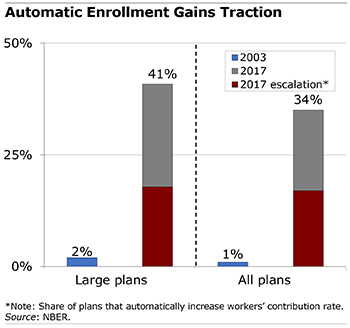
401k Plans Evolve to Boost Workers’ Savings
 Many employees in the private sector, when left to their own devices, either save very little in the company retirement savings plan or don’t even sign up for it.
Many employees in the private sector, when left to their own devices, either save very little in the company retirement savings plan or don’t even sign up for it.
But a growing number of companies have revamped their 401(k)-style plans over the past two decades to strengthen the incentives for employees to save. While progress has been gradual and uneven, the companies are moving in the right direction.
In a new study, researchers have compiled a unique nationally representative data set that tracks the changes employers have made to their 401(k)s and 403(b)s. The findings describe three important areas in which they are making progress:
- About 41 percent of the largest 4,200 U.S. employers in this study automatically enrolled workers in a savings plan in 2017 – up sharply from 2 percent in 2003. Workers can still opt out but the vast majority remain in the plans.
- Similar improvements were also evident in the study’s broader sample of employers of all sizes. In 2017, about a third of all companies had auto-enrollment, compared to virtually none in 2003.
- Among companies with auto-enrollment, about 44 percent of the large employers and half of the overall sample are automatically increasing their workers’ contributions.
- Contributions to the plans are generally rising too.
The researchers credited some of the improvements to the Pension Protection Act. The 2006 law explicitly allowed companies to automatically enroll employees in savings plans and also established a minimum standard for the level of employer contributions made by companies that adopt auto-enrollment.
To chart the changes in 401(k)s over time, the researchers constructed a database from the detailed descriptions of defined contribution plans from the 5500 forms that companies submit every year to the U.S. Department of Labor.
The value of this study is that it provides comprehensive information about the evolution of 401(k) plans, which are crucial to Americans’ retirement security.
To read this study, authored by Antoine Arnoud, Taha Coukhmane, Jorge Colmenares, Cormac O’Dea, and Aneesha Parvathaneni, see “The Evolution of U.S. Firms’ Retirement Plan Offerings: Evidence from a New Panel Data Set.”
The research reported herein was derived in whole or in part from research activities performed pursuant to a grant from the U.S. Social Security Administration (SSA) funded as part of the Retirement and Disability Research Consortium. The opinions and conclusions expressed are solely those of the authors and do not represent the opinions or policy of SSA, any agency of the federal government, or Boston College. Neither the United States Government nor any agency thereof, nor any of their employees, make any warranty, express or implied, or assumes any legal liability or responsibility for the accuracy, completeness, or usefulness of the contents of this report. Reference herein to any specific commercial product, process or service by trade name, trademark, manufacturer, or otherwise does not necessarily constitute or imply endorsement, recommendation or favoring by the United States Government or any agency thereof.
Comments are closed.







That was a fascinating read! The significance of retirement planning cannot be overstated. If you want to live a secure, stress-free life after retirement, you must begin saving for your future today. The advantages of careful financial planning are numerous, including tax breaks and ultimately, a corpus to pay your post-retirement expenditures.